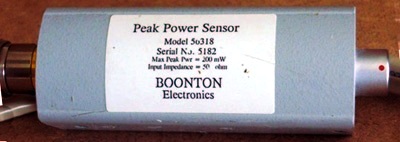
|
|
The Boonton 56318 Peak Power Sensor is constructed using balanced diode detectors. This dual diode configuration offers increased sensitivity and harmonic suppression when compared to a single diode sensor. It is for use with models 4400, 4500, 4400A, and 4500A analyzers. Model 4530 w/ 1 GHz calibrator Model 2530. Specifications. Frequency Range: 0.5 to 18 GHz. Peak Power Range(For pulse signal only): -24 to +20 dBm. CW Power Range: -34 to +20 dBm. Int. Trigger Range: -10 to +20 dBm. Overload Rating Pulse: 1 W for 1µs. Overload Rating Continuous: 200 mW. Sensor Response Fast Risetime: < 15 ns (Bandwidth 35 MHz). Sensor Response Slow Risetime: < 200 ns (Bandwidth 1.75 MHz). Maximum SWR: 0.05 to 2 GHz, 1.15; 2 to 16 GHz, 1.28; 16 to 18 GHz, 1.34. Impedance: 50 ohm. RF Connector: Type N (M).
|